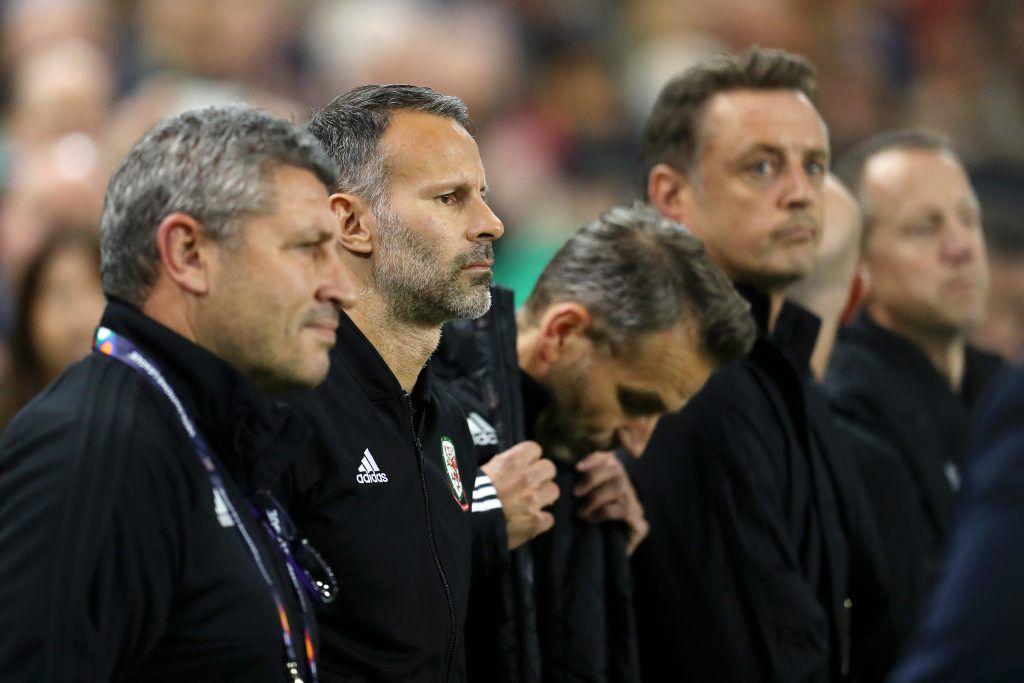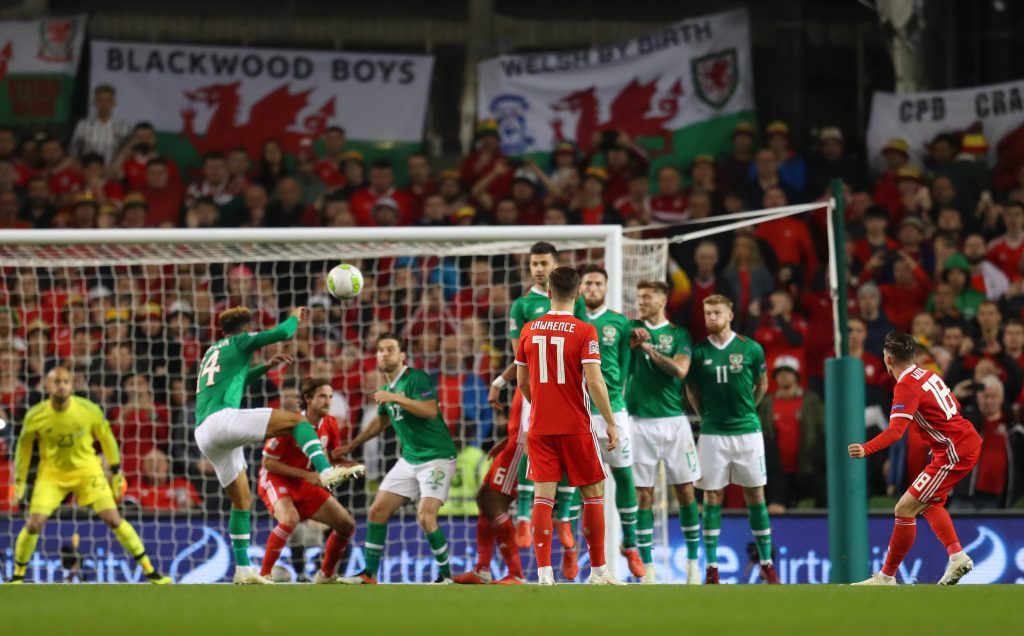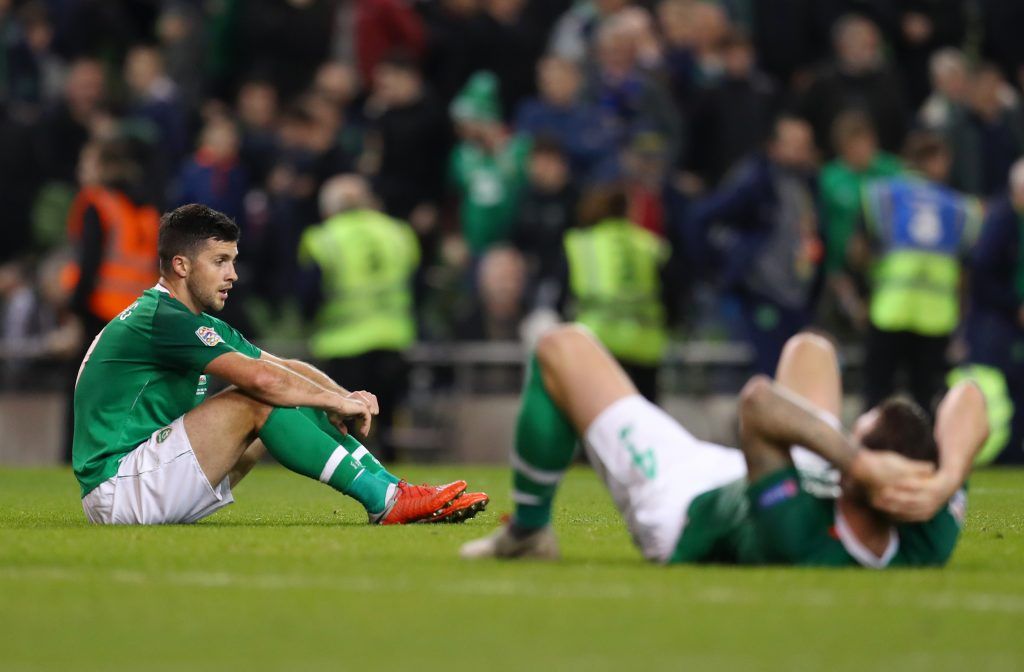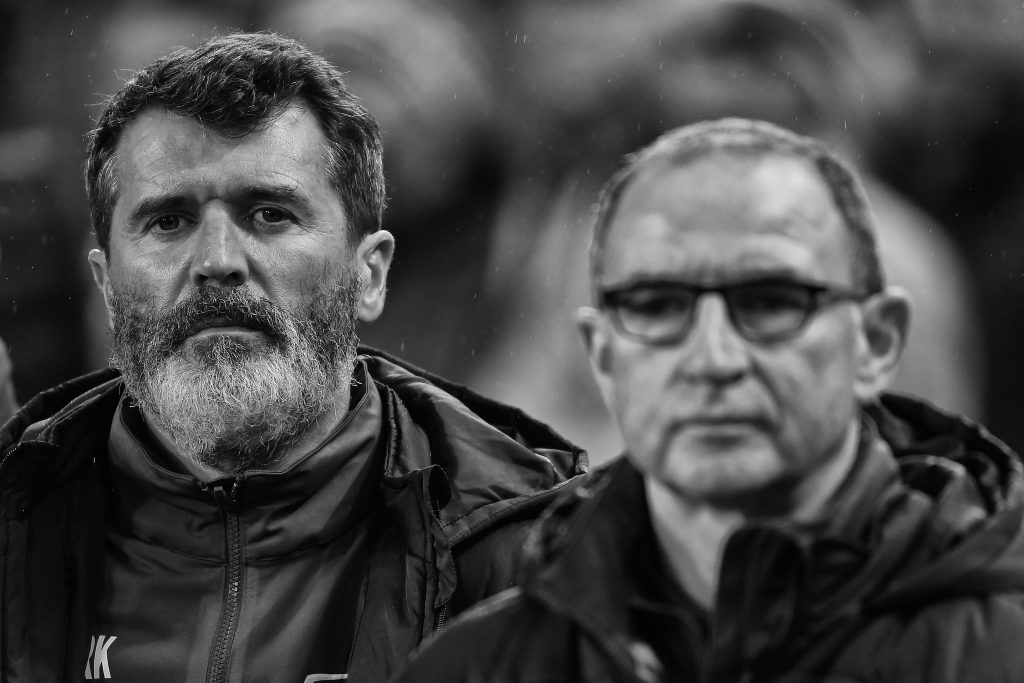

Share
17th October 2018
01:26pm BST

 Before the Wales defeat, the Ireland manager complained about his players' lack of "technical ability."
He lamented that he doesn't have a "natural goalscorer" and mourned the loss to injury of several players.
It was the same after the defeat. O'Neill came out with every single tired old complaint again, almost word for word.
https://twitter.com/SportsJOEdotie/status/1052308529338638336
https://twitter.com/SportsJOEdotie/status/1052307136104009733
In every press conference, the Ireland manager will touch on the same themes. There is usually a Brian Clough anecdote in there too.
He will say that the players need to be better in possession and to offer more in the final third. And then, nothing will change in the game.
It's almost as if there is no work done in training to try to implement those necessary changes. O'Neill has been in the job for over five years and the team can still barely string three passes together.
Yes, Ireland were more spirited and aggressive against Wales than they had been in the awful draw with Denmark a few days previously.
There was more intent, but equally little craft or any trace of an idea of play. The players ran around and forced some efforts on goal, but there was nothing constructive about the approach.
https://twitter.com/RobRedmond10/status/1052302445282394112
It was difficult not to feel sorry for the Irish players as they slumped to another dispiriting result. They are not world beaters, but they deserve better than this.
O'Neill's laissez-faire approach is no longer working. It was effective for two campaigns but has now crashed into nothingness. He is a short-term manager, someone who gives his teams a boost and fosters a strong spirit. But that has now gone.
All that is left is a manager complaining about what he doesn't have instead of making the most of the players at his disposal.
https://soundcloud.com/thefootballspin/ireland-improve-with-another-defeat-nations-league-ignominy-and-martin-oneills-defiance
The Ireland manager resorted to desperate and bizarre changes as the team chased the game. When Scott Hogan came on for Kevin Long with 15 minutes to play, James McClean looked to Richard Keogh. He had his arms outstretched and was gesturing frantically. Keogh did likewise and then looked towards Shane Duffy.
It was clear that the players had no idea what formation they were supposed to be playing, nor did many watching on. It was reminiscent of the collapse against Denmark.
Wales, with more Championship players on the pitch than Ireland and without their two best players, recorded a relatively comfortable win. Ryan Giggs must wish he could face Ireland in every game.
Before the Wales defeat, the Ireland manager complained about his players' lack of "technical ability."
He lamented that he doesn't have a "natural goalscorer" and mourned the loss to injury of several players.
It was the same after the defeat. O'Neill came out with every single tired old complaint again, almost word for word.
https://twitter.com/SportsJOEdotie/status/1052308529338638336
https://twitter.com/SportsJOEdotie/status/1052307136104009733
In every press conference, the Ireland manager will touch on the same themes. There is usually a Brian Clough anecdote in there too.
He will say that the players need to be better in possession and to offer more in the final third. And then, nothing will change in the game.
It's almost as if there is no work done in training to try to implement those necessary changes. O'Neill has been in the job for over five years and the team can still barely string three passes together.
Yes, Ireland were more spirited and aggressive against Wales than they had been in the awful draw with Denmark a few days previously.
There was more intent, but equally little craft or any trace of an idea of play. The players ran around and forced some efforts on goal, but there was nothing constructive about the approach.
https://twitter.com/RobRedmond10/status/1052302445282394112
It was difficult not to feel sorry for the Irish players as they slumped to another dispiriting result. They are not world beaters, but they deserve better than this.
O'Neill's laissez-faire approach is no longer working. It was effective for two campaigns but has now crashed into nothingness. He is a short-term manager, someone who gives his teams a boost and fosters a strong spirit. But that has now gone.
All that is left is a manager complaining about what he doesn't have instead of making the most of the players at his disposal.
https://soundcloud.com/thefootballspin/ireland-improve-with-another-defeat-nations-league-ignominy-and-martin-oneills-defiance
The Ireland manager resorted to desperate and bizarre changes as the team chased the game. When Scott Hogan came on for Kevin Long with 15 minutes to play, James McClean looked to Richard Keogh. He had his arms outstretched and was gesturing frantically. Keogh did likewise and then looked towards Shane Duffy.
It was clear that the players had no idea what formation they were supposed to be playing, nor did many watching on. It was reminiscent of the collapse against Denmark.
Wales, with more Championship players on the pitch than Ireland and without their two best players, recorded a relatively comfortable win. Ryan Giggs must wish he could face Ireland in every game.
 Shane Long ended up playing on the right-wing. Cyrus Christie was in midfield. McClean appeared to be playing as the left-back in the final few minutes. Duffy went up front.
Was there any work done on the training ground beforehand to plan for such a situation? It seems highly unlikely.
It was like something you'd see in an amateur match in your local park on a Sunday morning. A shambolic, shapeless mess.
Shane Long ended up playing on the right-wing. Cyrus Christie was in midfield. McClean appeared to be playing as the left-back in the final few minutes. Duffy went up front.
Was there any work done on the training ground beforehand to plan for such a situation? It seems highly unlikely.
It was like something you'd see in an amateur match in your local park on a Sunday morning. A shambolic, shapeless mess.
 The "we don't have the players" brigade now need to pause before spewing out that tired excuse.
It has become as boring and predictable as O'Neill's tedious Brian Clough references. Everyone knows "we don't have the players." That couldn't be more obvious.
The fact Ireland don't have great players isn't a defence of the management team. It's just another argument in favour of replacing them.
The "we don't have the players" brigade now need to pause before spewing out that tired excuse.
It has become as boring and predictable as O'Neill's tedious Brian Clough references. Everyone knows "we don't have the players." That couldn't be more obvious.
The fact Ireland don't have great players isn't a defence of the management team. It's just another argument in favour of replacing them.
 Ireland need a coach to make this modestly talented team more than the sum of their parts.
They need structure, a tactical plan and some clear instructions. They need to work on set-pieces in training. They need to be told the starting team before they arrive at the stadium.
They don't need to be reminded of their shortcomings, of the level they play at or to hear jibes about their lack of "technical ability." They need a new voice. Someone who can work as part of the Irish football structure, to have an input on developing players and improving the standard of the sport in the country.
Stephen Kenny ticks all of those boxes. The Dundalk manager should be O'Neill's replacement when the inevitable happens.
Ireland need a coach to make this modestly talented team more than the sum of their parts.
They need structure, a tactical plan and some clear instructions. They need to work on set-pieces in training. They need to be told the starting team before they arrive at the stadium.
They don't need to be reminded of their shortcomings, of the level they play at or to hear jibes about their lack of "technical ability." They need a new voice. Someone who can work as part of the Irish football structure, to have an input on developing players and improving the standard of the sport in the country.
Stephen Kenny ticks all of those boxes. The Dundalk manager should be O'Neill's replacement when the inevitable happens.
 Irish football needs to modernise, that is evident and has been for a very long time. But it's important to separate the micro and the macro issues within the sport in the country.
Right now, the most pressing concern is the management team. It is no longer working. The players and fans can't have another two years of this. It may even get worse if the team get a tough draw for Euro 2020 qualification when Ireland will most likely be third seeds.
O'Neill's effect has long worn off. He said following the game that the team will qualify for Euro 2020. But it's difficult to see where he gets his optimism from.
Irish football needs to modernise, that is evident and has been for a very long time. But it's important to separate the micro and the macro issues within the sport in the country.
Right now, the most pressing concern is the management team. It is no longer working. The players and fans can't have another two years of this. It may even get worse if the team get a tough draw for Euro 2020 qualification when Ireland will most likely be third seeds.
O'Neill's effect has long worn off. He said following the game that the team will qualify for Euro 2020. But it's difficult to see where he gets his optimism from.
 O'Neill won just seven of his last 31 matches as Sunderland manager and was without a win in eight games when he was sacked in March 2013.
That season, he complained that his team lacked "real, true quality." Does any of this sound familiar?
Ireland have won just two of their last 11 competitive matches - a fortuitous win over Wales last year and a stroll past Moldova. They've scored just five goals in their last eight competitive matches at home.
It won't get any better under this management team. A change needs to be made before the Irish team are consigned completely to the wilderness. It will cost a lot to replace them, but the long-term effects of persisting with them could be even greater.
O'Neill won just seven of his last 31 matches as Sunderland manager and was without a win in eight games when he was sacked in March 2013.
That season, he complained that his team lacked "real, true quality." Does any of this sound familiar?
Ireland have won just two of their last 11 competitive matches - a fortuitous win over Wales last year and a stroll past Moldova. They've scored just five goals in their last eight competitive matches at home.
It won't get any better under this management team. A change needs to be made before the Irish team are consigned completely to the wilderness. It will cost a lot to replace them, but the long-term effects of persisting with them could be even greater.Explore more on these topics: